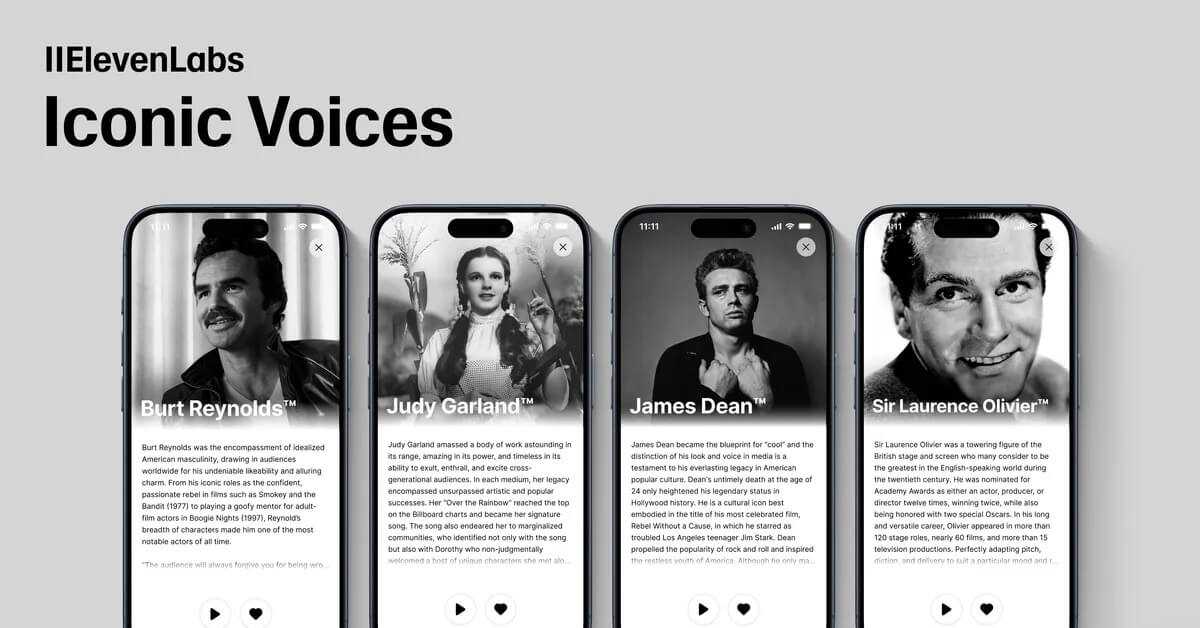(maadaa AI News Weekly: July 2 ~ July 8)
OpenAI Patches ChatGPT App for Enhanced Privacy
News:
OpenAI’s ChatGPT Mac app had a security flaw where conversations were stored in plain text, which made it vulnerable to unauthorized access. OpenAI has since updated the app to encrypt conversations.
Key Points:
- The ChatGPT Mac app’s previous conversation storage method posed a security risk.
- OpenAI released an update to encrypt conversations after the issue was highlighted.
- The update improves user privacy and data security.
Why It Matters:
This news highlights the importance of data privacy and security’s importance in AI. By addressing the security flaw, OpenAI not only safeguards user privacy but also likely enhances the quality and security of its training data, which is crucial for maintaining the reliability of its technology and the trust of its users.
2. Lights, Camera, AI-ction: Hollywood Legends Return to Narrate Your Favorite Books
News:
ElevenLabs has launched its Iconic Voices feature for the Reader app, allowing users to hear digital content narrated by AI-generated voices of legendary Hollywood stars like Judy Garland, James Dean, Burt Reynolds, and Sir Laurence Olivier.
Key Points:
- Voices are created in partnership with the celebrities’ estates
- Currently available only on iPhone in the US and UK
- Safeguards are in place to prevent misuse
- More celebrity voices planned for future addition
- The feature is integrated into ElevenLabs’ Reader app, which converts text to AI-narrated audio
Why It Matters:
This development is significant for enhancing AI training datasets as it provides high-quality, licensed voice samples of iconic performers. By working directly with estates, ElevenLabs has access to authentic voice data, potentially improving the accuracy and naturalness of AI-generated voices. This could lead to advancements in voice cloning technology and expand the possibilities for preserving and reimagining cultural legacies through AI.
3. Cloudflare’s Invisible Shield: AI Battles Bots Without Bugging Users
News:Cloudflare has launched a new tool called Invisible CAPTCHA to combat AI bots, using machine learning to distinguish between human and bot traffic without requiring users to complete traditional CAPTCHA challenges.
Key Points:
- Invisible CAPTCHA analyzes user behavior and device characteristics
- It aims to reduce friction for legitimate users while blocking malicious bots
- The tool is part of Cloudflare’s Bot Management solution
- It can be implemented with a single line of JavaScript
- Cloudflare claims a 91% reduction in bot traffic for early adopters
Why It Matters:
This is significant for improving AI training datasets by providing real-world data on human vs. bot behavior patterns. Cloudflare’s machine learning models can analyze large amounts of traffic to better distinguish between humans and advanced AI bots. This data can refine AI models for security and user experience and contribute to broader human-computer interaction research.
4. EMOKINE: Decoding the Body’s Emotional Language for AI
News:EMOKINE provides tools to analyze and create datasets of emotionally expressive full-body movements, offering 12 readily computed kinematic features (32 statistics total) to model emotional expressivity in motion.
Key Points:
Open-source software available on GitHub and Zenodo
Includes a pilot dataset of realistic full-body movement stimuli
Can be adapted to various motion capture systems
Extracts kinematic features like speed, acceleration, limb contraction, etc.
Offers tools for face blurring and silhouette extraction
Developed by an international, interdisciplinary research team
Why It Matters:
EMOKINE improves AI training datasets by offering quality data on emotional body movements, helping to analyze emotions in movement for better emotion recognition in AI. It standardizes kinematic feature extraction, fostering consistency in research and advancements in understanding human-computer interaction.
URL: https://github.com/andres-fr/emokine/tree/master
Additional News:
- RunwayML’s Gen-3 Alpha models have been officially released. Now, users can create incredibly realistic videos from text, images, or video prompts.
- A non-voting seat on OpenAI’s board has been granted to Apple as part of their AI agreement. Phil Schiller, Apple’s head of App Store and former marketing chief, will serve as the observer.
- A viral video shows a Phoenix cop stopping a Waymo Robotaxi for driving on the wrong side, surprised to find it driverless.
- Noland Arbaugh, Neuralink’s first human subject, hinted at potentially controlling the Tesla Optimus robot with the brain implant within a year.
- Google now requires disclosures for AI-generated political ads, mandating advertisers to reveal if their election ads feature ‘synthetic or digitally altered content.
- AI systems can accurately reconstruct what someone looks at based on their brain activity recordings. The reconstructions improve when the AI learns which parts of the brain to focus on.
maadaa.ai Shared Open and Commercial Datasets:
Open Dataset 1: Fashion-MNIST
Description: A dataset comprising 70,000 grayscale images of 10 fashion categories, each image sized 28x28 pixels. It serves as a more challenging replacement for the traditional MNIST dataset and is suitable for developing machine learning and computer vision algorithms for fashion retail.
URL: https://github.com/zalandoresearch/fashion-mnist
Open Dataset 2: MovieGraphs Dataset
The MovieGraphs dataset aims to annotate social interactions and character relationships in movies through graphs. It provides rich semantic information on film content, facilitating in-depth analysis of complex social interactions in movies.
http://moviegraphs.cs.toronto.edu/
Commercial Dataset 1: Traffic Sign Relationships Dataset
The “Traffic Sign Relationships Dataset” targets visual entertainment and autonomous driving, comprising internet-sourced images at a 1920 x 1080 resolution. It highlights the association between traffic signs and roadways by annotating signs with bounding boxes and marking relevant road sections with polygons, thus depicting their interrelation.
https://maadaa.ai/datasets/DatasetsDetail/Traffic-Sign-Relationships-Dataset
Commercial Dataset 2: Multi-Scenario, Multi-Person Instance Segmentation Dataset
The “Multi-Scenario, Multi-Person Instance Segmentation Dataset” is designed for diverse applications in visual entertainment, media & entertainment, and e-commerce & retail sectors. It consists of a collection of internet-collected images with resolutions exceeding 640 x 480 pixels. This dataset is characterized by its variety, featuring different scenarios such as individuals sitting, groups seated together, people holding props, interacting with various attire like hats and bags, and making different gestures. It employs instance segmentation and bounding box annotations to analyze human subjects within these varied contexts comprehensively.
https://maadaa.ai/datasets/DatasetsDetail/Multi-Scenario,-Multi-Person-Instance-Segmentation-Dataset
Source:
7. https://link.springer.com/article/10.3758/s13428-024-02433-0



